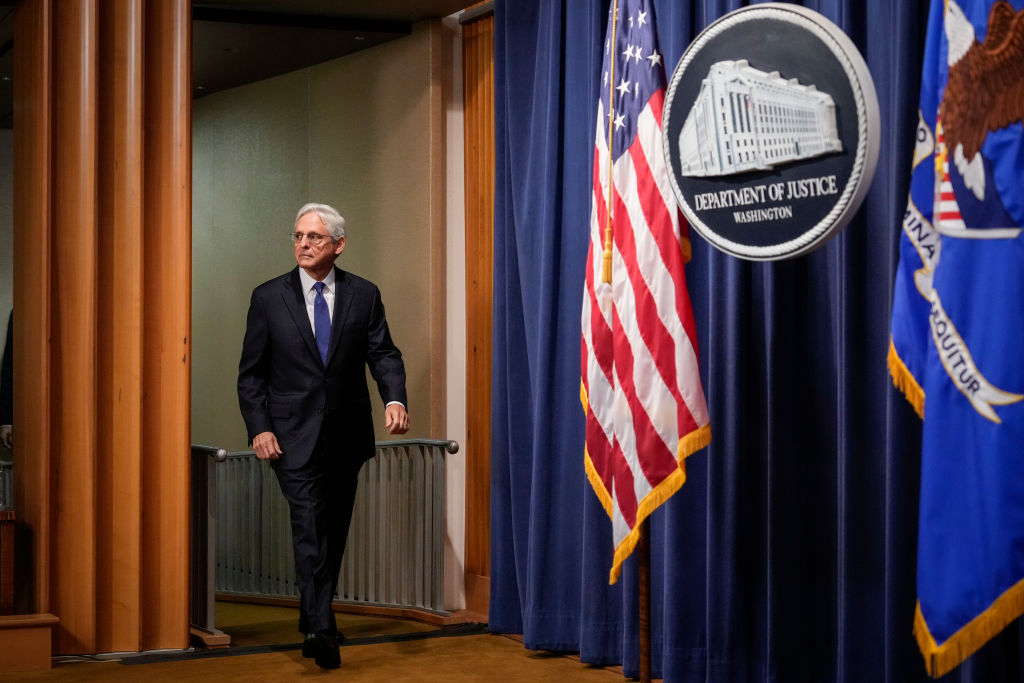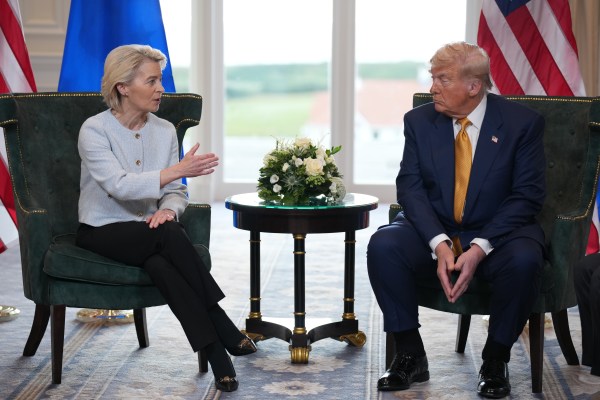Happy Monday! If you extrapolate Justin Fields’ stats from the Bears’ preseason opener on Saturday to a full 17-game season, he would throw for approximately 24,000 yards and 375 touchdowns—about 4.4 and 6.8 times the NFL single-season records, respectively.
If you’re interested in doing this kind of important math on a daily basis, a reminder that we’re looking for a new editor of The Morning Dispatch. Click here for more information!
Quick Hits: Today’s Top Stories
- Attorney General Merrick Garland announced Friday he had appointed David Weiss—the U.S. Attorney from Delaware who has been overseeing a probe into Hunter Biden since 2018—to serve as a special counsel to complete his investigation of the president’s son. The move comes weeks after the plea deal negotiated by Weiss and Hunter Biden’s legal team fell apart under scrutiny in federal court, leading many Republicans to argue the prosecutor is ill-equipped to handle the special counsel investigation.
- U.S. District Judge Tanya Chutkan on Friday rejected a broad protective order sought by federal prosecutors that would have barred former President Donald Trump from publicly discussing any evidence that’s part of the case related to his efforts to overturn the 2020 election. Chutkan did, however, agree to place certain restrictions on Trump’s ability to share sensitive material beyond potential witnesses and his defense team. “Mr. Trump, like every American, has a First Amendment right to free speech, but that right is not absolute,” Chutkan said. “In a criminal case such as this one, the defendant’s free speech is subject to the rules.”
- The death toll from the wildfire in West Maui rose to at least 96 over the weekend, making it the deadliest wildfire in the U.S. since 1918. Officials estimated that the cost of rebuilding will likely exceed $5 billion, as the fires burned more than 2,000 acres and destroyed the historic town of Lahaina. Hundreds of FEMA personnel and National Guard troops have been dispatched to the island to aid in recovery efforts.
- Attorneys for President Joe Biden have been negotiating the terms of an anticipated interview in the investigation into his handling of classified documents for about a month, NBC News reported Friday. The Department of Justice appointed former federal prosecutor Robert Hur as special counsel in January to investigate the president’s actions after classified documents were found in his Delaware home and a private office in November.
- China’s Ministry of State Security said Thursday Beijing had arrested a Chinese national for allegedly spying on behalf of the U.S., providing military secrets in exchange for cash and an expedited immigration process for his family. The rare statement comes one week after the Justice Department charged two U.S. Navy sailors in California—one of whom was born in China—with spying for Beijing.
- The data are incomplete, but COVID-19 cases and hospitalizations appear to be on the rise across the country as a new Omicron subvariant—EG.5, or “Eris”—becomes the most dominant strain of the virus. “While EG.5 has shown increased prevalence, growth advantage, and immune escape properties,” the World Health Organization said, “there have been no reported changes in disease severity to date.”
- The Islamic State claimed responsibility for an attack on a bus that killed at least 33 Syrian soldiers on Friday and wounded another 10. The terrorist group said it targeted the “two military buses” with “heavy weapons and rocket-propelled grenades,” and promised such attacks would continue. Islamic State violence has become more frequent in recent weeks as the group seeks to project force despite acknowledging for the first time that its leader, Abu al-Hussein al-Husseini al-Qurayshi, had been killed.
- Conservative talk show host Steve Deace formally endorsed Florida Gov. Ron DeSantis’ presidential campaign Friday. Deace has long been a prominent voice among religious conservatives in Iowa, where DeSantis and other GOP presidential hopefuls spent the weekend courting voters ahead of the state’s caucus in January.

In late June—shortly after IRS whistleblowers alleged U.S. Attorney David Weiss of Delaware had been stymied in his investigation of Hunter Biden—Attorney General Merrick Garland defended his decision not to appoint the federal prosecutor as a special counsel. “Mr. Weiss has more authority than a special counsel would have,” Garland said. “He had—and has—complete authority to bring a case anywhere he wants, in his discretion.”
Fast forward to Friday, and the attorney general was singing a different tune. “On Tuesday of this week, Mr. Weiss advised me that in his judgment, his investigation has reached a stage at which he should continue his work as a special counsel,” Garland told a hastily assembled group of reporters. “Upon considering his request, as well as the extraordinary circumstances relating to this matter, I have concluded that it is in the public interest to appoint him as special counsel.”
Because Garland walked away from the podium without taking any questions, we don’t know exactly what led to his change of heart. But odds are the collapse of the younger Biden’s plea deal last month had a lot to do with it. And with Weiss moving Friday to dismiss the case in Delaware so that he and his team of prosecutors can bring it in a different venue, Hunter’s name isn’t likely to fade from the headlines anytime soon. “When the parties were proceeding to a negotiated resolution in this matter, a plea in this District was agreed upon,” Weiss wrote. “After [last month’s] hearing, the parties continued negotiating but reached an impasse. A trial is therefore in order.”
At one point, Friday’s news would have been cause for celebration for Republicans, many of whom have been calling for Weiss to be made special counsel for months. But that was before the contents of what GOP lawmakers decried as his “sweetheart” deal with Hunter were made public. Within minutes of Garland’s announcement, dozens of Republicans were out with statements decrying the move. “If Weiss negotiated the sweetheart deal that couldn’t get approved, how can he be trusted as a Special Counsel?” House Speaker Kevin McCarthy wrote.
“This action by Biden’s DOJ cannot be used to obstruct congressional investigations or whitewash the Biden family corruption.”
Pursuant to Section 600.3 of the special counsel regulations, special counsels are supposed to come from “outside the United States Government,” something that Weiss—who will also remain on as U.S. Attorney in Delaware—does not do. Jack Smith, for example, was serving as a prosecutor in The Hague investigating war crimes before he was appointed last fall to probe former President Donald Trump. Robert Hur, the special counsel looking into President Biden’s retention of classified material, was in private practice at a law firm when Garland tapped him for a new role. There are exceptions, however, as former assistant attorney general Jack Goldsmith pointed out: John Durham, the special counsel who looked into the origins of the Trump-Russia investigation, was still a U.S. Attorney in Connecticut when then-Attorney General Bill Barr appointed him to his new post.
Setting aside his qualification for the job, Weiss had previously told Congress—contradicting the IRS whistleblowers’ accounts—that he hadn’t sought the protections and abilities that come with special counsel status. So why the change now? One former federal prosecutor—National Review’s Andy McCarthy—believes the move is designed to limit the political damage inflicted upon the Bidens. “Weiss is the vehicle by which the Biden Justice Department intends to maintain tight control over the so-called Biden investigation,” he alleged. “Weiss has all along compliantly acted as the vehicle by which the Biden Justice Department protects the president, and thus the president’s son, from a credible investigation.”
Another former federal prosecutor—Ken White—believes the rationale for the move is much simpler. Now that the plea deal has fallen apart and the case is headed for trial, the powers afforded a special counsel—namely the authority to bring charges in any jurisdiction—are actually useful. “When it was on the track that he was going to plead, it wasn’t necessary to push the issue,” White tells TMD. “But once you decide you’re going to charge in a way it’s going to go to trial, then having to get the cooperation of other U.S. attorneys, it’s just too bureaucratic. It’s better to have one person have the power to run with it.”
Although the initial charges against Hunter were technically brought in the wrong venue—Delaware—the younger Biden had agreed to waive any jurisdictional challenge as part of his deal with prosecutors. With that deal now in shambles, Weiss’ team—reportedly set to grow in Los Angeles and Washington, D.C.—will now get to work preparing a new indictment that will likely result in a trial. This new indictment could simply mention the same charges addressed by the defunct plea deal—two misdemeanor tax violations and a felony gun charge—or it could seek something harsher. Friday’s filing noted that prosecutors “may elect to bring the same charges set forth in the instant information or different ones.”
Perhaps the biggest remaining unanswered question is whether those hypothetical “different” charges could be related to Hunter’s foreign business dealings. Part of the reason the plea deal fell apart in the first place was Hunter’s lawyers’ insistence that he receive immunity from any such potential charges in the future. Although House Republicans have yet to unearth clear and unambiguous evidence of criminal wrongdoing by Hunter overseas, they’ve dug up a whole lot of sleazy behavior capitalizing on the family name.
Last week, for example, the House Oversight Committee released its third memo highlighting the lucrative financial arrangements of Biden family members. The latest report detailed millions in payments from foreign entities and individuals in Russia, Ukraine, and Kazakhstan to companies and accounts associated with Hunter and his former business partner Devon Archer. One instance involved a $142,300 payment from a Kazakhstani businessman for a sports car for Hunter. The committee has yet to uncover any proof of foreign money flowing directly to President Biden himself, but text messages from Hunter to his daughter seem to reference giving a portion of his salary to “pop.”
Despite it all, Hunter’s lawyer, Chris Clark, didn’t seem too concerned on Friday. “We are confident when all of these maneuverings are at an end, my client will have resolution and will be moving on with his life successfully,” he said in a statement. “This U.S. attorney has diligently been investigating my client for five years, and he had proposed a resolution which we fully intend to pursue in court.”
The High Price of Freedom for Five American Prisoners in Iran
In a rare interview from inside Iran’s notorious Evin Prison in March, Siamek Namazi—the longest-held American prisoner in the country—made an at times tearful plea to the Biden administration to free him and his fellow American captives. “The other hostages and I desperately need President Biden to hear us out—to finally hear our cry for help to bring us home,” he told CNN’s Christiane Amanpour. “I’m perpetually three weeks away from a freedom that is permanently elusive.”
After nearly eight years in captivity, Namazi may finally get his freedom—as part of a tentative deal announced by the Biden administration last week. Though five wrongly detained Americans are likely to return home in the coming weeks after many years of brutal captivity, critics argue the manner of their release—an agreement which includes a prisoner swap and the freeing-up of $6 billion in previously frozen Iranian funds—is essentially a ransom payment that will only put more Americans at risk by encouraging additional hostage taking by Iran and other hostile regimes like Russia or China in the future. Amid reporting the U.S. may have reached an understanding with Iran about reviving an agreement to limit its nuclear program and still-unanswered questions about the status of the administration’s Iran envoy, the hostage deal shifts the focus back to President Joe Biden’s approach to a significant U.S. adversary.
There are currently five Americans known to the U.S. government being held in Iran, all of whom, the administration says, are set to be released under the terms of the deal the White House and State Department confirmed Thursday. Namazi, Emad Sharghi, Morad Tahbaz, and two unnamed prisoners—one of whom is reportedly a scientist, the other a businessman—are all being held on sham spying charges. “Hostage-taking is the original sin of the Islamic Republic,” Gabriel Noronha, a fellow at Jewish Institute for National Security of America who served as special advisor for the Iran Action Group at the State Department from 2019 to 2021, tells TMD. “It was literally its founding act—taking 52 American diplomats hostage.” Those being held in Evin—known for its inhumane conditions for political prisoners—were reportedly moved to house arrest on Thursday, the first concrete step toward their release.
As part of the agreement, the United States will reportedly exchange several Iranian prisoners for the five Americans. The administration has not yet disclosed their identities, but several outlets have reported they were tried and convicted in the U.S. for violating sanctions against the Iranian regime. Pressed by The Dispatch, the State Department declined to provide additional details about the Iranian nationals set to be released.
The deal will also authorize South Korea to move $6 billion in frozen Iranian oil revenues to a bank in Qatar. Tehran will only be able to access the $6 billion for “humanitarian” use, the White House claims, as is allowed under the current U.S. sanctions regime. “In any event, in any respect, Iran will not be receiving any sanctions relief,” Secretary of State Antony Blinken told reporters Thursday. “And in any instance where we would engage in such efforts to bring Americans home from Iran, Iran’s own funds would be used and transferred to restricted accounts such that the monies can only be used for humanitarian purposes, which, as you know, is permitted under our sanctions. There’s an exemption for humanitarian that’s [been] there from the start.”
Critics of the deal take issue with the claim the money does not constitute sanctions relief—and with the notion it will only be used for humanitarian purposes. “[Blinken is] denying that there is any sanctions relief, but this is sanctions relief,” Jason Brodsky, policy director at United Against a Nuclear Iran, tells TMD. “The U.S. is not lifting sanctions that are on the books, but we are actually greenlighting the release of these assets and that is very concerning.”
Richard Goldberg, who served on the National Security Council (NSC) during the Trump administration, says the interpretation of what counts as “humanitarian” is quite broad—including allowing them to pay off government debts or dues to international organizations. Plus, of course, money is fungible. “[This deal] means that [Iran] can use $6 billion somewhere else, for anything else,” Goldberg, currently a senior advisor at the Foundation for the Defense of Democracy, tells TMD. “So all this is, is budget support.”
That’s certainly how officials in Tehran see it, contradicting the Biden administration and suggesting there will be no restrictions at all on Iran’s forthcoming windfall. “The process of releasing billions of dollars from the assets of the Islamic Republic of Iran, which were illegally seized in South Korea by the United States for several years, has begun,” the country’s foreign ministry said. “The decision on how to utilize these unfrozen resources and financial assets lies with the Islamic Republic of Iran.”
Critics are also worried the funds transfer—which comes out to $1.2 billion per prisoner—will be construed as a ransom for Americans’ freedom, potentially incentivizing additional hostage-taking in an already-tense global environment. Russia, for example, is currently detaining several Americans, including Wall Street Journal reporter Evan Gershkovich. “This is the largest hostage payment in U.S. history,” Noronha, who was involved in negotiating the prisoner swaps that returned Princeton student Xiyue Wang and former sailor Michael White, tells TMD. Rep. Steny Hoyer, Democrat of Maryland and the former House Majority Leader, agrees, suggesting the move could lead to more “kidnappings and shakedowns.”
Hoyer was unique among Democrats for his condemnation of the deal, however. “It’s so hacky to say it’s a ‘ransom,’” Sen. Chris Murphy of Connecticut tweeted. “It’s not. The fact that Iran is our enemy doesn’t change the law. And the law says the $6B is Iran’s money that we were holding. And it can only be used to buy oil and food for people in need.” One of the prisoners reportedly being released in the deal, conservationist Morad Tahbaz, is a constituent of Murphy’s.
Even if one concedes the payment is a ransom, the U.S. wouldn’t be alone in paying to free its people. France, Italy, Spain, and several other European countries have all paid ransoms to terrorists holding their citizens, and a 2017 analysis from the left-leaning New America think tank suggested citizens of countries that paid ransom weren’t necessarily more likely to be kidnapped.
The prisoner deal coincided with a Wall Street Journal report suggesting Iran had begun to slow its accumulation of enriched uranium and down-blend some of its enriched stockpile—theoretically lengthening the time it would take to create a nuclear bomb. White House spokesman John Kirby denied Friday that any such slowdown, while “welcome,” was the result of formal negotiations with the U.S., but—as we reported earlier this summer—there are rumblings that the U.S. is pursuing an informal, unwritten understanding with Iran regarding its nuclear program. (A deal would have to be submitted for congressional approval.) The analysts who spoke to TMD suggested the unfrozen funds could be part of that understanding.
The announcement that the captives may be coming home also led Robert Malley—the Biden administration’s special envoy to Iran on leave since May—to tweet for the first time in several months, celebrating the Americans’ return. As we reported in July, Malley’s security clearance is under review and he may be facing an FBI investigation. The State Department did not engage with questions from The Dispatch regarding Malley’s involvement in the prisoner deal—and when he would be returning from leave.
Malley is not alone in his celebration of the prisoners’ coming freedom—critics of the deal are still glad the hostages will be coming home and being reunited with their loved ones. They’re just concerned about the cost. “I feel for those Americans,” Noronha says. “I worked to try to get their release for two years, and I was very glad to help them. But the way that this is being done will result in far, far more Americans ending up in prison, being separated from their families. And so we are sacrificing huge numbers of future American families and future American citizens.”
Worth Your Time
- In the Washington Post, Henry Olsen highlights the success of David Seymour, an MP in New Zealand and leader of the country’s ACT New Zealand political party. At a time when right-wing populism is on the rise worldwide, Seymour has embraced libertarianism—and his party has grown dramatically as a result. “This success is fueled by Seymour’s insistence on applying classically liberal principles to issues beyond just taxes, regulation and spending,” Olsen writes. “He can do that because, as he told me, ‘there is a deep underlying philosophical base to what we’re saying, so it’s all coherent.’ That theme—stick to your principles and calmly explain their application to whatever issue is at hand—repeatedly came up in our discussion.”
- Literary Hub published an excerpt from William B. Helmreich’s book, The New York Nobody Knows, and we were blown away by Helmreich’s dedication to his craft. “My initial plan was to walk twenty representative streets of the city from end to end and use them as a basis for the book. But I soon realized that there was no way any particular twenty or even one hundred streets could claim to represent a city as large as New York. To do it right I would simply have to walk the entire city, a daunting but eminently worthwhile project,” he writes. “I ended up walking about 6,000 miles, the distance between New York City and Los Angeles and back to New York (4,998 miles), and then from New York City to St. Louis.”
Presented Without Comment
Financial Times: Offshore Wind Boom Gives King Charles a 45% Pay Rise
Also Presented Without Comment
WKYC: 3 Former GOP Operatives to Pay $50k for Roles in Fake Charity Tied to East Palestine Train Derailment
Also Also Presented Without Comment
Fox 2 Detroit: Woman Finds Live Frog Found Inside Sealed Organic Spinach Package
Toeing the Company Line
- In the newsletters: The Dispatch Politics team previewed the upcoming GOP presidential primary debate, Jonah weighed in on efforts to make accessing pornography more difficult, Nick wrote about (🔒) the decline in serial killers, and Stirewalt and his colleague Nate Moore dove into (🔒) how ethnic subgroups are shaping Wisconsin politics.
- On the podcasts: Jonah bounced from Trumpy populism to Israel’s governmental framework to public morality. Oh, and The Remnant was nominated for the best political podcast in the 2023 Podcast Awards!
- On the site over the weekend: Christopher Scalia reviewed Joseph Epstein’s new book on the importance of fiction and Zach Kessel reviewed Matt Lewis’ new book on the exorbitant wealth of the D.C. political class.
Let Us Know
Do you expect Iran to increase its hostage taking as a result of the Biden Administration’s deal?








Please note that we at The Dispatch hold ourselves, our work, and our commenters to a higher standard than other places on the internet. We welcome comments that foster genuine debate or discussion—including comments critical of us or our work—but responses that include ad hominem attacks on fellow Dispatch members or are intended to stoke fear and anger may be moderated.
With your membership, you only have the ability to comment on The Morning Dispatch articles. Consider upgrading to join the conversation everywhere.